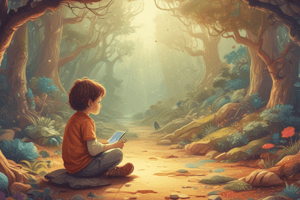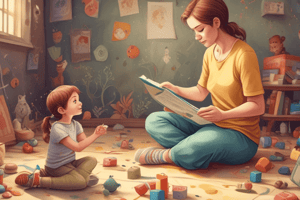Podcast
Questions and Answers
O que é a cultura lúdica?
O que é a cultura lúdica?
- Um conjunto de práticas e valores associados ao lazer e ao brincar (correct)
- Um tipo de jogos eletrônicos
- Um estilo de vida saudável
- Uma atividade competitiva
Qual é o papel dos adultos no brincar das crianças?
Qual é o papel dos adultos no brincar das crianças?
- Ficar longe das crianças enquanto brincam
- Ensinar regras de jogos
- Fornecer um ambiente seguro e estimulante (correct)
- Proibir brincadeiras violentas
Quais habilidades são desenvolvidas pelas crianças através do brincar?
Quais habilidades são desenvolvidas pelas crianças através do brincar?
- Habilidades de resolução de problemas e criatividade (correct)
- Habilidades de linguagem
- Habilidades de liderança
- Habilidades matemáticas
Qual é o tipo de brincar que se concentra em desenvolver habilidades, como construir com blocos?
Qual é o tipo de brincar que se concentra em desenvolver habilidades, como construir com blocos?
O que é uma característica comum do brincar das crianças?
O que é uma característica comum do brincar das crianças?
Como a tecnologia afetou o brincar das crianças?
Como a tecnologia afetou o brincar das crianças?
Por que é importante preservar a cultura lúdica na infância moderna?
Por que é importante preservar a cultura lúdica na infância moderna?
O que é um exemplo de brincar construtivo?
O que é um exemplo de brincar construtivo?
Quais são os benefícios do brincar para o desenvolvimento das crianças?
Quais são os benefícios do brincar para o desenvolvimento das crianças?
O que é um exemplo de brincar dramático?
O que é um exemplo de brincar dramático?
Flashcards are hidden until you start studying
Study Notes
Defining Ludic Culture
- Ludic culture refers to the cultural practices and values associated with play, games, and leisure activities.
- It encompasses the ways in which individuals, especially children, engage with and make sense of their surroundings through playful experiences.
Importance of Play in Children's Development
- Play is essential for children's cognitive, social, emotional, and physical development.
- Through play, children:
- Develop problem-solving skills and creativity
- Learn social skills, such as cooperation and communication
- Practice emotional regulation and empathy
- Develop fine and gross motor skills
Characteristics of Children's Play
- Children's play is often characterized by:
- Imagination and fantasy
- Experimentation and exploration
- Spontaneity and flexibility
- Social interaction and collaboration
- Joy and pleasure
Types of Play
- There are several types of play, including:
- Functional play: focused on developing skills, such as building with blocks
- Constructive play: focused on creating something, such as drawing or building
- Dramatic play: focused on role-playing and imagination
- Games with rules: focused on following rules and competing with others
The Role of Adults in Children's Play
- Adults play a crucial role in supporting and facilitating children's play, including:
- Providing a safe and stimulating environment
- Encouraging imagination and creativity
- Modeling playful behavior
- Engaging in play alongside children
Impact of Technology on Children's Play
- The rise of technology has changed the way children play, including:
- Increased screen time and sedentary behavior
- Shift from traditional play to digital play
- Changes in social interactions and relationships
- Potential for increased isolation and decreased physical activity
Preserving Ludic Culture in Modern Childhood
- It is essential to preserve ludic culture in modern childhood by:
- Encouraging outdoor play and physical activity
- Providing opportunities for creative and imaginative play
- Limiting screen time and promoting balanced use of technology
- Supporting and valuing children's playful experiences
Studying That Suits You
Use AI to generate personalized quizzes and flashcards to suit your learning preferences.




